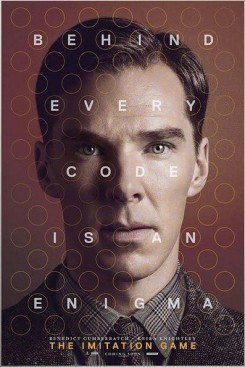

Reviewing a biopic like The Imitation Game (IMDB) raises issues that don’t apply to average movie. Normally I prefer to review a movie in isolation for its entertainment value, without worrying too much about how accurately it represents its source material. But when the movie is about real historical figures and events can’t avoid asking whether it is telling the truth or misleading its viewers.
The issue can be particularly acute with a biopic of a scientist. Generally the most important thing about a scientist is his work, but too often the filmmakers have little real interest in this, or assume that the audience doesn’t. As an example of what can go wrong, consider A Beautiful Mind (2002) (IMDB). This is an entertaining movie if you approach it as a work of fiction, but considered as a biography of mathematician John Nash it is a tissue of lies. It misrepresents the nature of his work, the nature of his illness and practically every detail of his life.
So how does The Imitation Game stack up? To begin with, this biopic of Alan Turing, a pioneering mathematician, codebreaker and computer scientist, is quite entertaining and thought-provoking. On the other hand the filmmakers don’t deny that they have hyped-up elements of the story to make it more exciting and cinematic. Have they gone beyond the bounds of what is acceptable?
In my view there are 3 things that everyone should know about Alan Turing:
- He was one of the founders of computer science, whose work helped shape the world we live in today.
- During World War II he played a key role in England’s Bletchley Park codebreaking team. By breaking the German’s Enigma cypher they made a huge contribution to the Allied victory.
- After the war the nation that he had helped save persecuted him horribly for his homosexuality, and this persecution probably led to his suicide.
The movie actually does a decent job of conveying each of these 3 basic points. They manage to mention his most important theoretical contribution, the “universal machine,” better known today as the “Turing machine.”
(Turing described a ridiculously simple programmable computer and provided a mathematical proof that given enough time it could solve any problem that could be solved by any computing device. This had important long-term consequences since it encouraged engineers to devote their resources to developing powerful general-purpose computers instead of devices optimized to solve a narrow range of problems.)
In other ways the movie is more questionable. Benedict Cumberbatch as Turing turns in a terrific portrayal of an autistic savant–but people who knew Turing deny that he was autistic, at least to the socially isolating extent portrayed in the movie. It’s a reasonable guess that he may have been somewhere on the autism spectrum and that this may have contributed to some of his personal problems. It’s impossible to be sure since he probably never met anyone qualified to make such a diagnosis. It wasn’t an idea that people were familiar with in those days, even professional psychiatrists.
Most of the movie is devoted to the Bletchley Park codebreaking years, and here the movie hypes things up enormously and gets most of the details wrong. It is an intellectually interesting story, but one that is not at all cinematic, so I’m inclined to give the filmmakers a fair amount of slack here. But I couldn’t help snickering at the climactic scene where Turing has a brilliant insight in a bar and the codebreakers rush back to the lab to apply the insight to crack Enigma and win the war. In fact the idea is something that any amateur cryptographer would have come up with in the first five minutes of the project.
Much more problematic the portrayal of Commander Denniston (Charles Dance) the head of the project. He is depicted as a narrow-minded martinet whose dim-witted obstructionism repeatedly threatened the project. This seems to be completely false. No doubt the filmmakers felt they needed a good villain to spice things up (Hitler being inadequate.) But there is something pretty distasteful about portraying a real person in a way that would be grounds for a libel suit if he were still alive. If they were going to fictionalize him it would be easy enough to change his name.
Still on the whole I like the movie. It is fun to watch, and viewers who have never heard of Alan Turing will come out with a picture of him that is probably more accurate than misleading.

